Many words and phrases of seafaring origin have weaseled their way into regular English usage. The Captain — often a bit of a “loose cannon” when he’s “three sheets to the wind” — shares a dozen of his favourite nautical crossovers.
01. LOOSE CANNON
In today’s lingo means: An unpredictable person or thing, liable to cause damage if not constantly accompanied by a minder; on no account to be given grog.
Back in the day meant: From the 16th to 19th centuries, sea power meant cannons, lots of them, dealing mass broadsides from extremely close range. They were mounted on rollers and secured with rope because the recoil after firing was intense. A “loose” cannon free- ranging around the confines of a crowded gun deck in the midst of a naval battle, chopping off appendages willy-nilly, could be a fearsome beastie and more dangerous to the crew than Barnaby Joyce is to the National Party.
02.BATTEN DOWN THE HATCHES
In today’s lingo means: Prepare for trouble; get ready, shit and fan are about to intersect.
Back in the day meant: When evil weather threatened, a ship’s hatches (The Captain is assuming you know what a damn hatch is, OK?) were covered with tarpaulins; the tarp was then edged with wooden strips, known as “battens”, so it wouldn’t flap its way to freedom. Sailors called this “battening down
03. CHOCK-A-BLOCK
In today’s lingo means: Crammed so damn tightly together that movement is impossible.
Back in the day meant: “Chocks” were (and still are) wooden wedges used to secure casks and other items of weighty cargo prone to rolling about in a ship’s hold when the sea gets a bit boisterous. A “block and tackle” is a pulley system used to hoist sails and haul cargo. “Chock-a-block” is what happens when the system is run out to the end, there is no more rope free and the blocks jam tightly together.
04. LOG BOOKS AND KNOTS
In today’s lingo means: A log book is a record of a ship’s (or car’s, or truck’s for that matter) operation and navigation. And “knot” is a measurement of ocean speed.
Back in the day meant:
In ye olde times, a ship’s progress was calculated by tossing a wooden board (log) into the briny with a string attached. The rate at which the string was unravelled as the ship moved away from the stationary log was measured by counting how long it took between knots in the string. So that explains “log book” and “knots”.
05. CUT AND RUN
In today’s lingo means: Drop everything and leg it; it’s all too hard, I’m outta here; retreat, head for the hills. The shit has hit the fan!
Back in the day meant: The natives are well and truly restless. If you wait around to weigh anchor, you’re tomorrow night’s kebab. Solution: cut the anchor cable, make sail instantly, and run before the wind to get away unscathed. In old-school sea battles, after blowing the shit out of each other at extremely close range, the violent vessels would often become intentionally entangled so that pirates and sailors could leap aboard for the cut and thrust. If your boat was getting the worst of the stoush, “cutting” away rigging and “running” away was the sensible option — if your head was still attached to your body, that is.
06. HIGH AND DRY
In today’s lingo means: Stranded; left in the lurch; abandoned.
Back in the day meant : This term originally referred to ships that were beached. Wooden ships were regularly run ashore — “beached” or “careened” so that work could be done on the hull, which was prone to rot, sprung planks and woodworm — all of which reduced the hull’s effectiveness in its primary function, keeping the water outside the boat. “Dry” also had a less innocent meaning — it was used to indicate that, not only were said vessels out of the water, but had been for some time and would probably not be getting wet any time soon. Perhaps the company had gone bust or the vessel was beyond repair. Game over.
07. BY AND LARGE
In today’s lingo means: Generally speaking; all things considered.
Back in the day meant: For centuries, scurvy sea dogs referred to a wind blowing from a compass point behind a ship’s course direction as “large”. “By” meant “in the general direction of”. So to be “by the wind” was facing into the wind or close enough (within six compass points). To sail “by and large” was almost impossible for square-riggers, which were really only happy sailing downwind. The 19th-century windjammers like Cutty Sark managed it by using triangular sails fore and aft to drag the ship sideways against the wind — and a gun hand on the rudder.
08. HAND OVER FIST
In today’s lingo means: With speed and in abundance (often referring to making money); fast as f**k.
Back in the day meant: Sailors used the phrase when talking about hauling on/in or climbing a rope — the fist being the hand gripping the rope. Ironically it then indicated slow and steady progress, as you would expect hauling in a net or rope, rather than light- speed success. Modern times, eh? Go figure.
09. THREE SHEETS TO THE WIND, OR “GROGGY
In today’s lingo means: Confused: befuddled; tired and emotional; but usually pissed as a fart.
Back in the day meant: “Sheets” in ye olde mariner speak are ropes fixed to the lower corners of sails, to hold them in place. If three sheets are loose and blowing about in the wind then the sails will flap and the boat will reel about like, er, a drunken sailor. “Grog”, beloved intoxicant/pain reliever of seafarers, is the no-brainer of cocktails, made from equal part spirits and water. In the early 1700s, Admiral Edward Vernon (known as “Old Grog” for his habit of wearing a “grogram” — coarsely woven fabric — jacket) in a burst of OH&S madness decided to reduce the daily half-pint rum ration for the British “tars” under his command to a “tot” and water it down so it was less intoxicating. One thing led to another and the sailors had a “grog” ration, too much of which would still make them “groggy”. Worse times lay ahead. In 1970 the Royal Navy grog ration was abolished completely.
10. SLUSH FUND
In today’s lingo means: A stash/Swiss account/sea chest of money put aside to be used to bribe or influence others, usually politicians.
Back in the day meant: “Slush”, or “slosh” was the grease and fat obtained from boiling down salt beef or pork aboard ship. Regarded as a bonus for the ship’s cook and crew — who would sell the rancid slop when they reached port — this perk was eventually tagged a “slush fund”. (Captain’s note: this was prior to the discovery of refrigeration and the microwave — don’t judge them too harshly, for they knew naught of nutrition.)
11. FREEZE THE BALLS OFF A BRASS MONKEY
In today’s lingo means: Yep, it’s bloody cold!
Back in the day meant: Cannon balls were piled on the deck in a pyramid fashion. To prevent them from rolling across the deck they were retained in a brass monkey or ring. If temperatures got cold, the ring would contract faster than the cannon balls sending them toppling. No monkeys were actually harmed, thankfully.
12. THE BITTER END
In today’s lingo means: As far as you can go; the sediment at the bottom of a bottle of organic home brew; when there’s about twenty seconds of daylight left but you have to stay for one final cast.
Back in the day meant: A “bitt” was a post in the deck of a ship used to coil cables and ropes. When a rope was uncoiled to the “bitter end” there was no more rope. Finito. In the US Navy, the phrase means the final six fathoms of anchor chain remaining in the chain locker when the ship is at anchor.

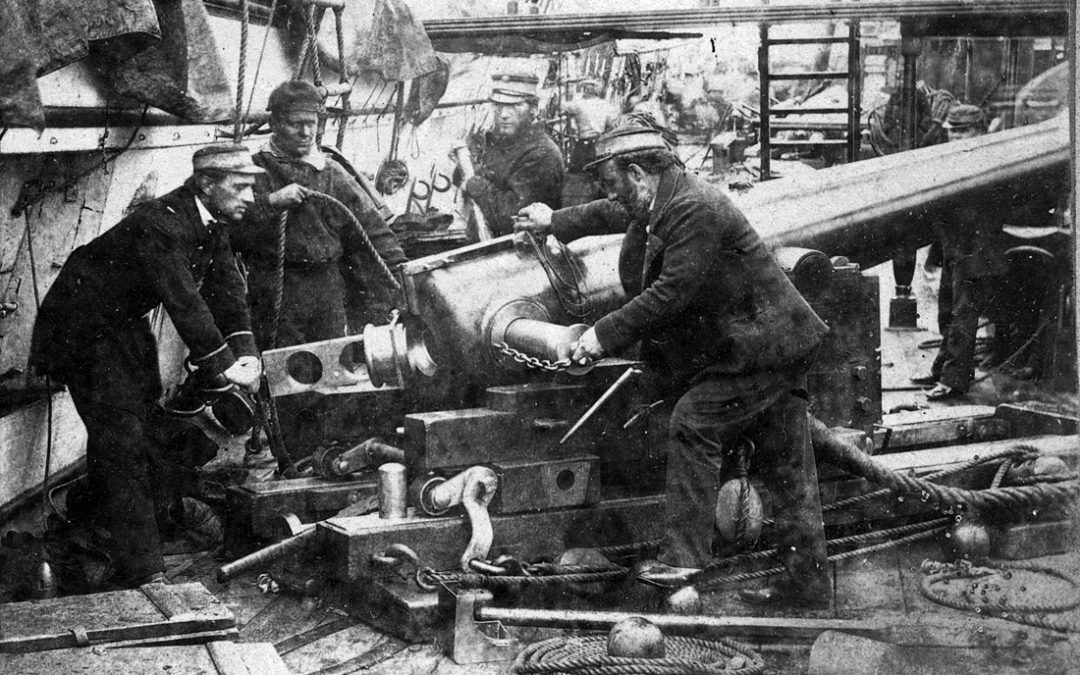

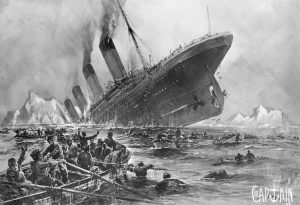
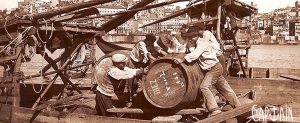
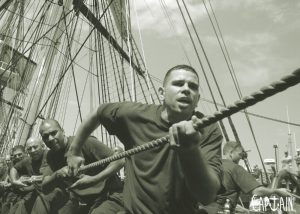
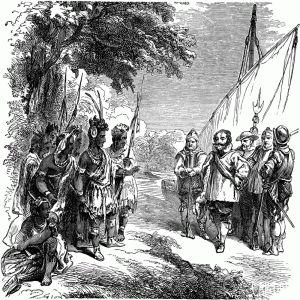
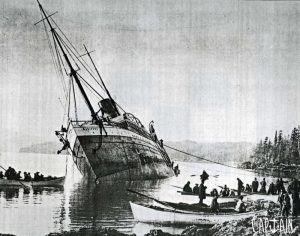
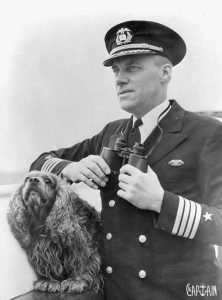
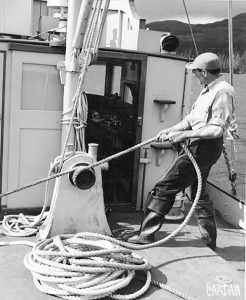
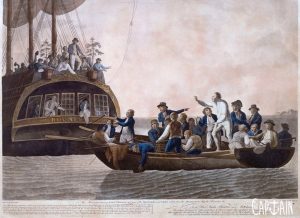
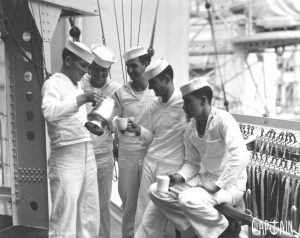
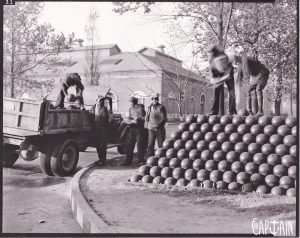
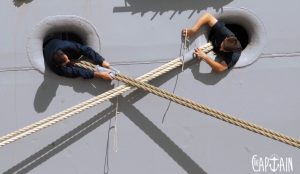
Recent Comments